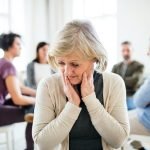Decreased sense of smell linked to higher depression risk in older people
A new study has found significant evidence linking a decreased sense of smell with an increased risk of developing late-life depression.
While this research does...
Social isolation can harm people in heart failure, study finds
A recent study conducted by Mayo Clinic researchers in a rural region of southeast Minnesota sheds light on the impact of social risk factors...
Depression linked to early death in people with diabetes, study finds
A new study conducted by at New Mexico State University and elsewhere sheds light on the long-term impact of depression among American adults diagnosed...
How antidepressants, ketamine and psychedelic drugs may make brains more flexible
The first-line pharmacological treatment for major depressive disorder (MDD) are antidepressant drugs known as selective serotonin re-uptake inhibitors (SSRIs).
But a significant proportion of people...
Some people with severe depression cannot get ketamine treatment
The treatment of patients with treatment-resistant depression poses a significant challenge within the public health system due to systemic barriers that make effective and...
Heated yoga shows promise in reducing depression symptoms
In a recent clinical trial led by Massachusetts General Hospital (MGH), researchers discovered that heated yoga sessions had a significant positive impact on adults...
Insomnia and mental disorders are linked. But exactly how is still a mystery
The 2004 movie The Machinist gives us a striking depiction, albeit a fictional one, of the psychological effects of chronic insomnia.
When people don’t have...
Scientists detect early signs of bipolar disorder
Researchers from the University of Manchester and Keele University have identified key indicators of bipolar disorder in individuals who have been diagnosed with other...
ChatGPT may manage depression better than doctors, study finds
In a study published in the open-access journal Family Medicine and Community Health, researchers have found that AI chatbots like ChatGPT can potentially outperform...
Ultra-processed foods linked to cognitive decline, shows study
In recent years, research has consistently shown that consuming ultraprocessed foods can lead to various health issues, including inflammatory bowel disease, cancer, obesity, and...










